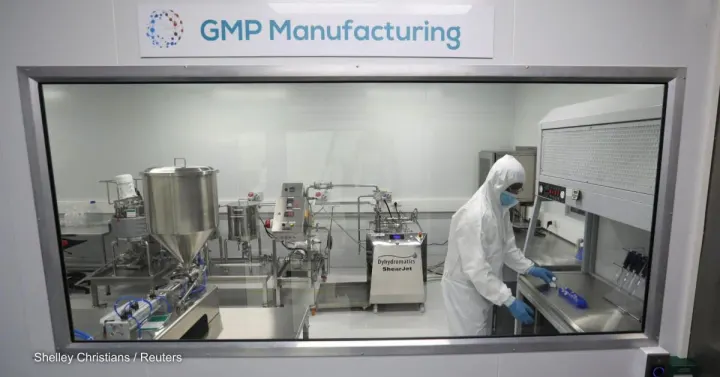As published on Devex on August 22, 2024.
The article is a collaboration between Rabin Martin and the Private Sector Roundtable on Global Health Security (PSRT), the cross-industry coalition that we lead as Secretariat.
Since the COVID-19 pandemic, there has been growing interest in expanding local manufacturing of pharmaceuticals, vaccines, medical devices, and diagnostics in lower- and middle-income countries to address the stark fact that Africa imports 99% of its vaccines and 95% of its medicines.
Numerous initiatives are underway, including those decided upon during the African Union Summit in Ethiopia earlier this year and echoed by World Health Organization’s Director-General Tedros Adhanom Ghebreyesus at the Ministerial Consultation on Local Manufacturing at the World Health Assembly in May. Tedros made two complementary points that deserve repeating:
- Local production can play an important role in improving timely, equitable access to quality, safe, and effective health products and safeguarding health security.
- For local production to be realized, an enabling ecosystem must be developed.
The collective experiences of the Private Sector Roundtable on Global Health Security (PSRT) member companies, many of which have manufacturing sites in multiple countries, reinforce these perspectives. Local manufacturing alone will not solve the complex challenge of Africa’s dependence on imports and the vulnerabilities the continent faced during the COVID-19 pandemic.
It is important to be clear that domestic manufacturing can add important capabilities as countries plan for future health crises, but this policy response is not a panacea.
As William Haseltine of ACCESS Health International observed in Forbes earlier this year, “Just increasing production within lower and middle income countries … is not enough to achieve global drug equity.”

An employee at work at a WHO-backed mRNA vaccine hub in Cape Town, South Africa. Photo by: Shelley Christians / Reuters
PSRT experience shows that countries will need to address a multifaceted set of issues to improve access to affordable, quality-assured medicines, vaccines, devices, and diagnostics.
These include: having a clear understanding of the epidemiological realities faced by countries and the therapeutic and diagnostic interventions required to address them; enabling business environments that will attract new investment; robust and efficient regulatory frameworks that will help companies to perform to international quality standards.
Furthermore, it will need an adequate supply of financing, both for initial investments in infrastructure and equipment and for working capital as companies expand. Access to active pharmaceutical ingredients and other raw materials will also be crucial, especially since there’s a continued reliance on global suppliers. Adequate training is needed to increase the number of skilled workers and a talent pipeline. Reliable sources of power, water, waste management, and transportation are essential too. Finally, access to new technologies and know-how is also needed.
In addition to those challenges on the supply side, local manufacturers must contend with market fragmentation, a lack of market intelligence, unpredictability of demand, a limited supplier base, and inefficiencies in government procurement and supply chain policies and practices.
To achieve the goal of resilient supply chains to ensure equitable access to essential products, an end-to-end approach is critical — “build it and they will come” is not a winning strategy. Solutions to the domestic manufacturing problem should keep the following recommendations in mind if the goal is to lead to both improved population health and stronger industrial capabilities in low- and middle-income countries:
- The right mix of economic factors and technical capabilities to establish resilient and sustainable local manufacturing industries for drugs, vaccines, and diagnostics. It’s not a coincidence that the current geography of the pharmaceutical and vaccine industry in Africa is centered in just a few countries — Egypt, Algeria, Tunisia, and Morocco in North Africa, and Nigeria, South Africa, Kenya, and Ghana in sub-Saharan Africa. These are the countries that have the combination of market size and the enabling factors to support a domestic industry.
- An integrated ecosystem of primary manufacturers, together with research and development capabilities, supporting industries and technology platforms, and the right enabling factors such as market design, access to finance, a strong regulatory system, technology transfer and intellectual property, infrastructure, and a skilled workforce.
- Regional manufacturing hubs, which can aggregate demand across previously fragmented markets, in addition to removing trade and regulatory barriers to supply.
The recent report of the Global Preparedness Monitoring Board comes to a similar conclusion: “Neither R&D nor supply chains can be equitable and robust if they are concentrated in a small number of regions and countries. Regional capacities should play a catalytic role in ensuring that national capacity-building is sustained and adapted to national circumstances.”
The experiences of China, India, and Brazil, and in other markets as varied as Singapore, Ireland, Turkey, and South Africa, show that expanding local manufacturing of drugs, vaccines, medical devices, and diagnostics is possible with attention to the right enabling conditions. In these countries, the private sector has been critical in helping governments build an ecosystem that has led to both improved public health and robust economic productivity and growth.
We are now beginning to see encouraging examples where these enabling conditions are coming together in Africa, with the support of national governments, global donors, development finance institutions, and the private sector.
The African Union is establishing an African Medicines Agency, to build on the work of the African Medicines Regulatory Harmonization, complementing the work of the African Centers for Disease Control and Prevention. The African Continental Free Trade Agreement, which will provide a borderless trading area across the continent once fully implemented, also promises to create conditions that will be more conducive to cross-border trade and pooled procurement to help on the demand side.
Future success will depend on continued private sector engagement for cross-sectoral collaboration, coordination across the entire manufacturing ecosystem, and sustainable and flexible financing.
The challenges are too complex for any one entity or government to accomplish on its own — long-term success will require partnerships at every level, with the support of all partners, including the private sector, both domestic and multinational.